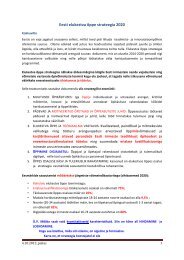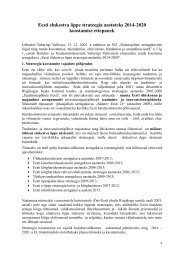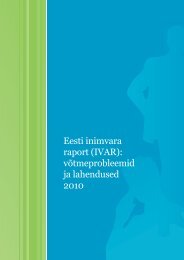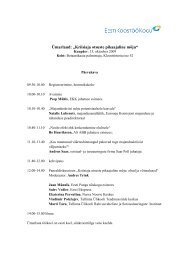Estonian Human Development Report
Estonian Human Development Report - Eesti Koostöö Kogu
Estonian Human Development Report - Eesti Koostöö Kogu
Create successful ePaper yourself
Turn your PDF publications into a flip-book with our unique Google optimized e-Paper software.
school, and the media) to avoid the marginalization of a troublingly<br />
large proportion of young people, such as the unemployed,<br />
drug addicts, or lawbreakers. Meanwhile, international<br />
studies of education indicate that while our current<br />
education system guarantees the success of the majority of<br />
<strong>Estonian</strong> school pupils in studying different subjects, it does<br />
not provide them with sufficient opportunities for personal<br />
development and instruction in the field of values.<br />
The third troubling social aspect is the excessive differences<br />
between people’s state of health and quality of life<br />
in general by region and ethnicity, which, for example, has<br />
brought about an accumulation of different social risks<br />
in North-Eastern Estonia. In a situation where the financial<br />
means of the country are dwindling, this may lead to<br />
an explosive rise in social tensions. At the same time, the<br />
Russian-speaking population has developed heightened<br />
expectations and a stronger reliance with regard to public<br />
security systems than <strong>Estonian</strong>s, thus creating a favourable<br />
environment for manipulation with protest mentality.<br />
In addition to the Russian-speaking population, there also<br />
exist other social groups whose vulnerability is increased<br />
during the crisis due to their reliance on public policies.<br />
These vulnerable groups include pensioners and people<br />
with disabilities, whose growing fears and sense of helplessness<br />
may affect the entire society.<br />
What dangers and opportunities does the<br />
critical economic situation generate with<br />
regard to human development?<br />
<strong>Human</strong> development is affected most immediately by the<br />
situation in the labour market; this is especially true with<br />
regards to the unemployment rates which have already<br />
started to grow and will snowball in 2009. In relation to<br />
this, we need to find a quick solution for the reorganization<br />
of the training system due to the increasing need for<br />
in-service training and retraining. The developing situation<br />
is made even more volatile by the fact that many white-collar<br />
employees, younger and older specialists, i.e. people who<br />
have thus far belonged to the middle class will lose their jobs.<br />
This will be the first time when unemployment will affect<br />
the “winners” of the transition society, ambitious and consumption-prone<br />
young people whose social self-esteem and<br />
level of unconcern has hitherto been very high. The expectations<br />
of these groups regarding labour market measures,<br />
including their retraining needs, are completely different<br />
from those of unemployed weavers or miners. Meanwhile,<br />
their existing social resources are much greater. Due to this,<br />
the European Social Fund could be used to promote business<br />
activity on a much wider scale than usual. The upcoming<br />
situation is not reflected in the current labour market<br />
policy, where highly educated unemployed people are<br />
almost completely unaccounted for.<br />
The high debt burden of young families (which was one<br />
of the reasons used to justify the adjustment of the parental<br />
benefits to the current level of salaries) can bring about a<br />
critical situation in many families when they stop receiving<br />
parental benefits but have no employment opportunities. Due<br />
to this, we should consider reducing the size of the parental<br />
benefits in favour of lengthening the period of time during<br />
which payments are made. Regardless of the economic crisis,<br />
we cannot abandon the development of the child care system.<br />
In the context of the economic crisis, we should adopt an<br />
especially cautious approach to families with children in general,<br />
particularly those with only one breadwinner and above<br />
all, those cases where the only breadwinner is in danger of<br />
becoming unemployed. This may have far-reaching social<br />
consequences when, as a result of their parents’ unemployment,<br />
children lose the opportunity to obtain quality education,<br />
participate in hobby activities and play sports.<br />
The economic downturn has a very dangerous influence<br />
on health, especially due to social stress, which serves<br />
to further increase Estonia’s unprecedented high risk of<br />
cardiovascular diseases, alcoholism and drug addiction,<br />
depression, and suicide, as well as tendencies towards violence<br />
and aggressive behaviour, both inside families and<br />
in schools and public spaces.<br />
Taking into account the differences among social and<br />
ethnic groups in terms of trust in the state as well as their<br />
ability to cope with difficulties, the amplification of social<br />
protest and conflict is likely if the media, the politicians,<br />
and the civil society are unable to create and maintain the<br />
society’s readiness for and belief in overcoming the difficulties<br />
together.<br />
What should be preserved and what should<br />
be changed in terms of economic and social<br />
policy in order for us to survive the crisis as<br />
painlessly as possible with regard to human<br />
development or even emerge from it in a<br />
better shape than before?<br />
In our current situation, it is especially important to consider<br />
the social impact of all decisions related to economic<br />
and budgetary policy (on which social policy depends to a<br />
large degree) as well as the method of presenting the decisions<br />
to the public with the aim of<br />
• avoiding or compensating for the deterioration in the<br />
quality of life of vulnerable target groups (the decisions<br />
made at the end of 2008, which worsened the<br />
quality of life of people with disabilities and pensioners<br />
are an example of what to avoid);<br />
• avoiding an increase in health risks and continuing preventive<br />
activities aimed at improving public health;<br />
• preventing the negative effects of the crisis on the quality<br />
of life of children by implementing special support measures<br />
in the case of their parents becoming unemployed;<br />
• preventing negative demographic effects with regard<br />
to both the birth rate and emigration;<br />
• preventing panic and the aggravation of ethnic and<br />
social tensions.<br />
It is during the economic crisis that we should devote more<br />
attention to the non-material aspects of the quality of life,<br />
especially the psychological sense of security and trust in<br />
the fact that the social environment, including the authority<br />
of the state, is functioning in the public interest.<br />
The effect of the crisis could be mitigated considerably<br />
by the more effective use of funds provided by the European<br />
Social Fund as well as other European sources with<br />
respect to human development (i.e. public health, natural<br />
increase, quality of life, employment, involvement, the<br />
socialization of youth, the protection of risk groups, etc.). It<br />
is important to monitor carefully whether the projects correspond<br />
in practice to the most urgent social needs (ministries<br />
along with local governments, scientists, and partners<br />
from the civil society should weigh the priorities once more<br />
155 |















